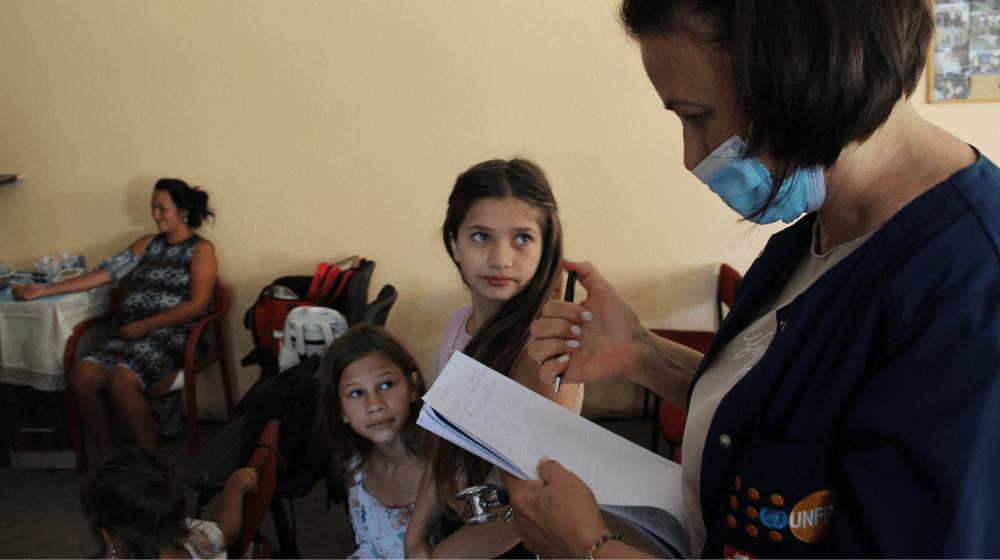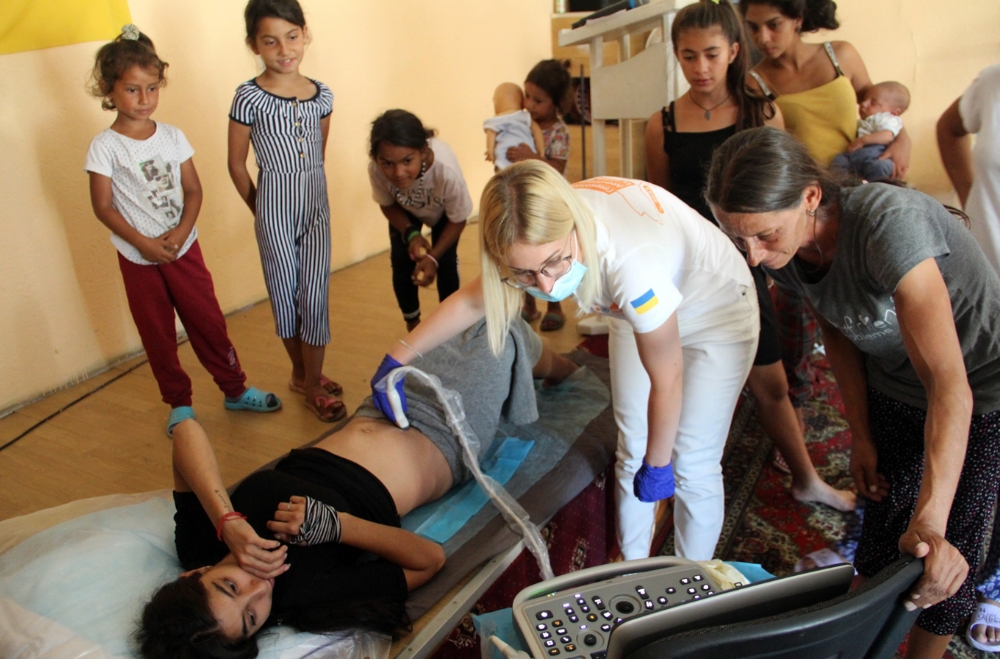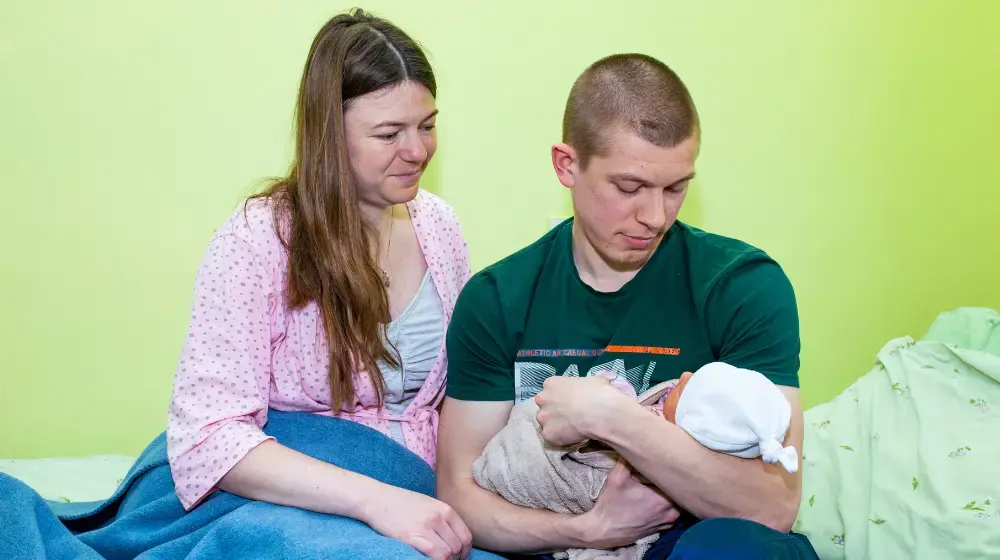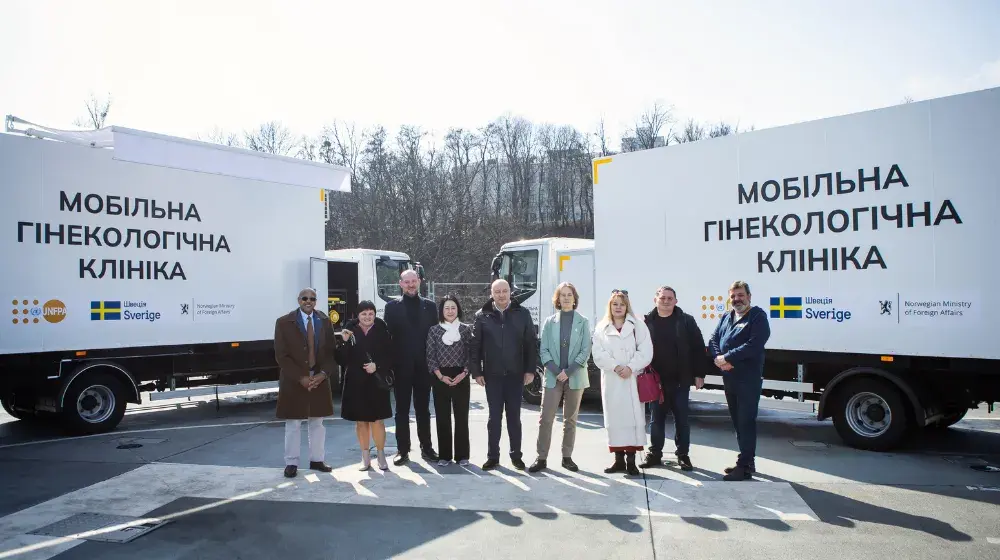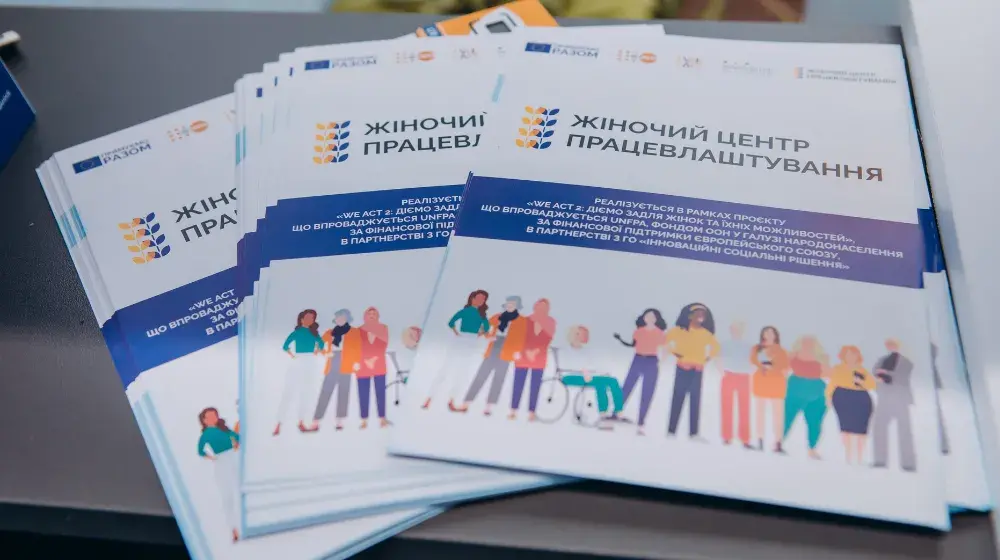There is quite a buzz today in the Roma settlement on the outskirts of Uzhhorod. Women of different ages are hurrying here: both with children and without, pregnant, very young, and elderly ladies.
Today is an important day because the specialists from the mobile gynaecological team in Zakarpattia have arrived. The medical professionals will provide consultations, perform ultrasounds, measure blood pressure and blood sugar, test for diseases, and offer family planning advice.
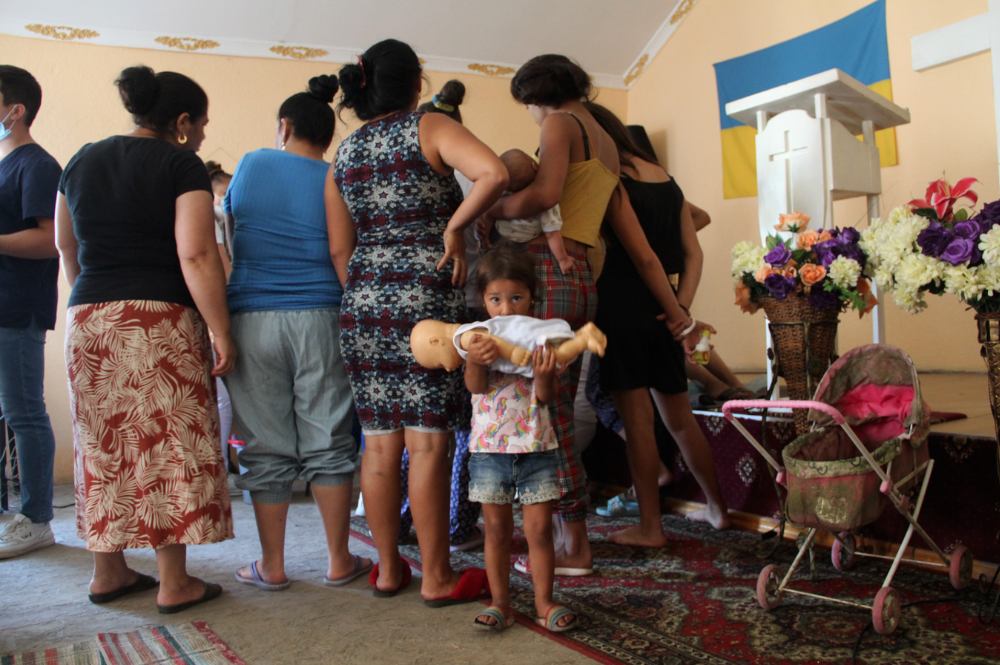
Kristina recently gave birth and came to the doctors' appointment with her newborn. She says she wants to get a checkup for "women's issues."
"I didn't get a chance to have an ultrasound test earlier, and I haven't had time to go to the doctors with the kids. I have three of them: 1.5 months, 4, and 7 years old," shares Kristina. "It's really great that the doctors came to us. I usually visit gynaecologists, but the wait for an appointment is long—one or two months. I need an abdominal ultrasound, my kidneys still hurt, and I'd also like my youngest son to have a checkup."
Kristina's friend, Viola, is also waiting in line for an ultrasound. She sees her family doctor, but rarely has time to see specialists, so she's happy to get everything done here.
The mobile gynaecological teams are equipped with a range of services to provide general health care, and serve as an important space for the community to access medical attention. Next door, Margareta is having her blood pressure checked, after being tested for blood sugar levels. During the previous appointment, the mobile gynaecological team diagnosed her with diabetes for the first time and prescribed medication and a special diet. Margareta is worried because her sugar levels are higher than before.
"If you continue eating like this, it won't be good. You must stick to the diet, I warned you about the consequences," explains the doctor. "And don't forget to take the medication!"
The patient agrees to take more responsibility, though she appears anxious. However, the doctor reassures her in Hungarian. The specialists here are not only trained in their medical fields but are also fluent in several languages, with Hungarian being a priority for the Roma community.
Some pregnant Roma women are not registered for medical care at all.
Svyatoslav Borshosh, an obstetrician-gynaecologist, ultrasound specialist, and oncologist, has been working with the mobile gynaecological team since October 2022, when UNFPA, the United Nations Population Fund, the Institute for Family and Child Development, and the Uzhhorod Maternity Hospital signed a joint cooperation agreement. Since then, he and his colleagues have examined over 4,000 women.
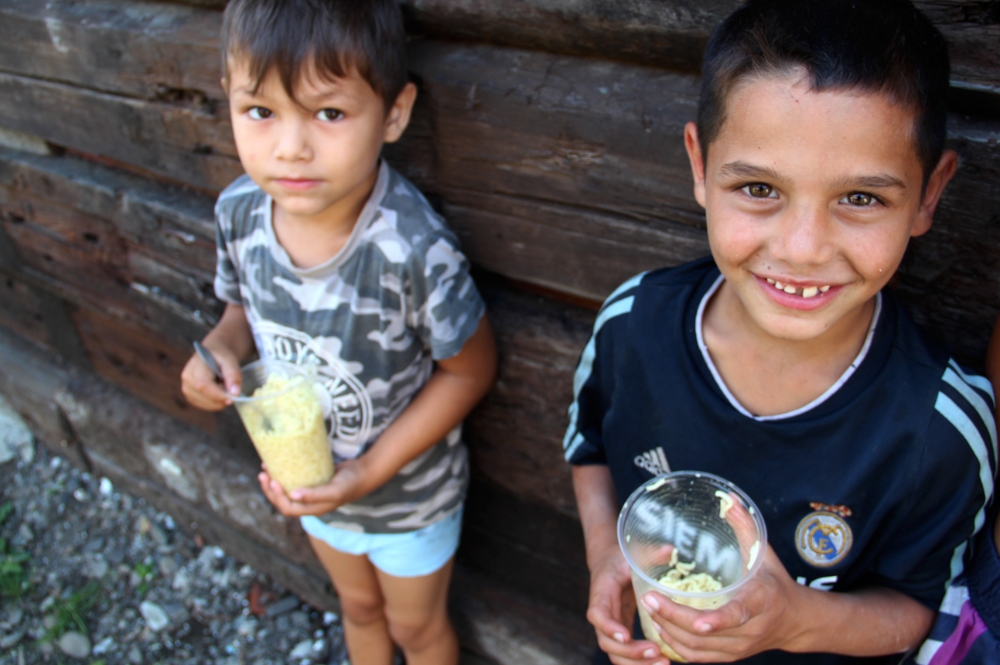
"Sometimes men come in, wanting to check their blood sugar or get tested for hepatitis. We see everyone, but our patients are primarily women. For pregnant women at 34 weeks or later, we perform cardiotocography (CTG) and ultrasounds. Some women come to us because they are struggling to conceive. After their initial visit, they often come to our state clinic to undergo additional tests through a free program, preparing for pregnancy," explains the doctor. "For those without maternity cards, we refer them for registration. If we find health issues, such as cysts or benign tumors, we send them to the hospital for treatment."
The doctor highlights the unique aspect of the Roma settlement, noting that some women may not be registered for prenatal care throughout their entire pregnancy and may arrive at the maternity ward without any documentation.
Meanwhile, Sviatoslav Borshosh is performing a cardiotocography (CTG) for a patient and explains, "A cardiotocogram allows us to monitor the baby's heartbeat and check if the baby is comfortable inside. The second sensor detects any early contractions, and the third sensor, which the mother holds in her hand, is pressed whenever the baby kicks. This device is portable, just like our ultrasound equipment. If necessary, during power outages or in field conditions, we can conduct examinations directly from the vehicle, as it is equipped with power cables. This is especially effective during blackouts."
The team performs prenatal and postnatal examinations, assesses pregnancy complications, identifies high-risk cases, and provides consultations on women's health, including sexual and reproductive health, alongside gynaecological examinations. Their primary goal is to detect and prevent diseases early, ensuring timely treatment.
"If we detect even benign tumors early, we can halt their growth. If they are malignant, they can be removed in time. Many women, for example, who were diagnosed with cancer and treated early have greatly benefited," says Sviatoslav Borshosh.
"Roma women respect the doctors . During our time here, many children have been born, including through C-sections. Women prefer to come to us at the Uzhhorod maternity hospital. Currently, in this particular camp, we have up to 20 pregnant women," he adds.
With the full-scale invasion, Roma settlements have seen an influx of displaced Roma, creating new challenges. One of the pregnant patients went missing several times—sometimes she was in Uzhhorod, other times in Odesa—but eventually, she gave birth successfully in Zakarpattia's regional center. Over the past two years, the Roma population has been highly mobile; according to the community pastor, around 1,500 Roma live in the camp, with some leaving and others arriving.
In the mobile gynaecological unit, the team includes an obstetrician-gynaecologist, ultrasound specialist, pediatrician, therapist, and nurse. Pediatrician Kateryna Debretseni notes that the most common patient concerns are related to seasonal infections, proper feeding practices, vaccinations, and allergy issues.
"Allergies during the spring-summer period are a very relevant issue," comments Dr. Kateryna Debretseni. "I should note that all recommendations are being followed by the mothers. When we come here, we see the results: the child is already vaccinated, the child has been to the specialists we referred them to, and there are results from the treatment. Today, I am seeing 15 patients, with the youngest being two months old and the oldest boy being 14 years old."
Patients now consider the doctors as friends, and when they come for a visit to the maternity ward, they are happy to see them. “Oh, my doctor is here!” is something the staff of the mobile gynaecological team often hears. Among them is a Romani woman who came with her daughters. She wants to have an ultrasound check-up and brought the girls with her, as one of her daughters is pregnant.
Marina Login, a midwife, explains that blood tests for sugar are currently as popular as gynaecological examinations, especially after the COVID epidemic, as many patients struggle with this issue. However, women care about their health and are responsible, even though they often live in less than favorable conditions. “Thank you for coming to us!” — the women gather around the medical staff, sharing their life stories and concerns, asking for consultations, and inquiring when the doctors will come again.
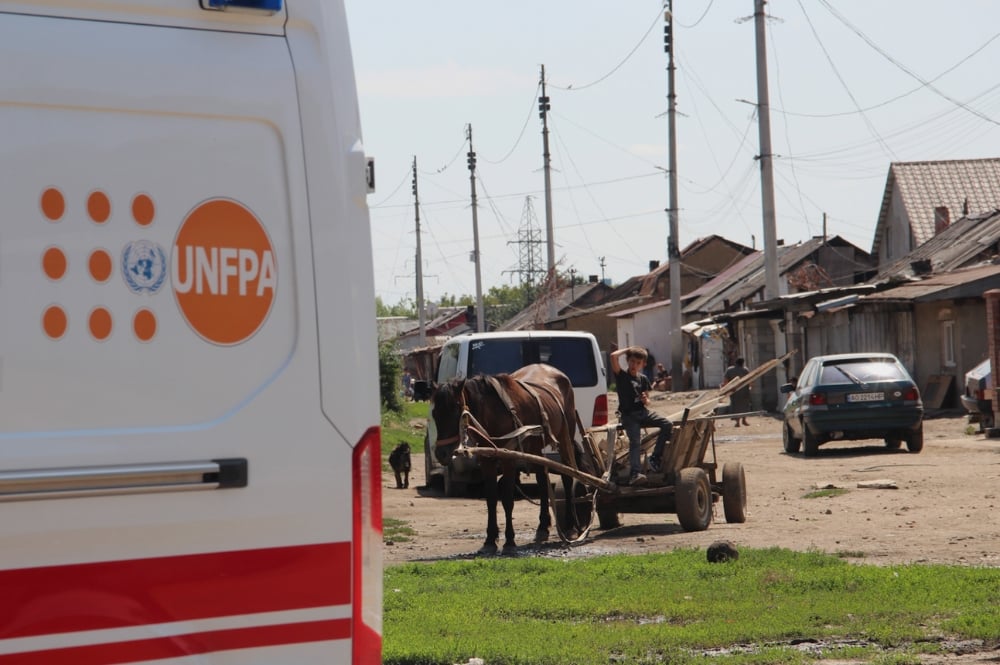
The mobile gynaecological teams operate within the framework of humanitarian response measures by UNFPA, the United Nations Population Fund in Ukraine, with financial support from the European Union, the Ministry of Foreign Affairs of Denmark, Sweden and the Republic of Korea.

